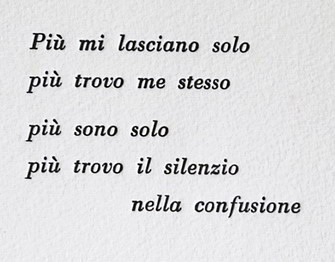From the little book "Confusion" by Pulcinoelefante
 Loneliness, for me, is an intrinsic condition of human existence, an inner space that can be frightening but, if embraced, becomes a precious ally. It is not the absence of people that makes me feel lonely but rather the quality of the relationships around me. I often think of Nietzsche and that passage from Zarathustra where he says: "My solitude does not depend on the presence or absence of people; on the contrary, I hate those who steal my solitude without, in return, offering me true companionship." That’s exactly how it feels: superficial connections, which the world is full of, only distract me from my essence. Silence, on the other hand, helps me rediscover it.
Loneliness, for me, is an intrinsic condition of human existence, an inner space that can be frightening but, if embraced, becomes a precious ally. It is not the absence of people that makes me feel lonely but rather the quality of the relationships around me. I often think of Nietzsche and that passage from Zarathustra where he says: "My solitude does not depend on the presence or absence of people; on the contrary, I hate those who steal my solitude without, in return, offering me true companionship." That’s exactly how it feels: superficial connections, which the world is full of, only distract me from my essence. Silence, on the other hand, helps me rediscover it.
Being alone is an art, a skill that takes time and patience to cultivate. When I allow myself the privilege of solitude, I immerse myself in a deep dialogue with myself. I admit that I often talk to myself out loud. It’s not madness, but a way to give shape to my thoughts and make them clearer. In those moments of reflection, I explore my aspirations, my fears, and my contradictions. It is there, far from the gaze of others and the weight of expectations, that I discover who I really am. Solitude thus becomes an inner laboratory, a place where my being is forged.
Yet I don’t see solitude as a permanent state. Its beauty lies in its transience, like a pause that adds value to the notes of a melody. If it lasts too long, it risks turning into isolation, and I know well how that can erode the soul and feed a sense of emptiness. That’s why I try to distinguish between chosen solitude, which enriches me, and imposed solitude, which impoverishes me.
Another aspect that makes me reflect is the meaning of companionship. True companionship doesn’t simply fill a void but creates a bridge between two solitudes. It’s something that arises from mutual understanding, from the ability to be present without invading, to give without demanding. I deeply dislike those who steal my solitude without offering me a genuine connection. They are thieves of time and energy. Conversely, true companionship is a gift that enriches both sides, a sincere exchange that values each individual’s uniqueness.
And so, I ask myself: how good is it for me to be alone? The answer, I admit, isn’t always clear. For me, solitude is often a refuge, a place where I can be free, but I also know it cannot be a permanent retreat. Balance is the key: knowing how to be alone to understand and grow, but also carefully choosing whom I want by my side along my path.
Ultimately, solitude is a mirror that reflects who I am and who I want to be. When I accept it as an ally, it ceases to be a threat and transforms into a path towards inner freedom. Only then do I choose to open up to others—not out of necessity but out of an authentic desire to share my humanity.


